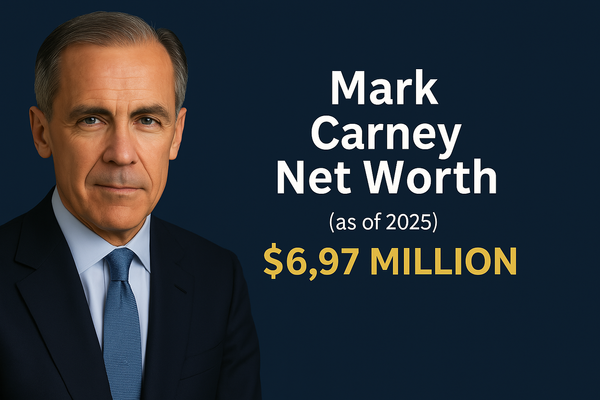Is Mark Carney a Billionaire? The Truth About His Real Net Worth
Mark Carney makes people wonder if he's a billionaire, given his remarkable career as a central bank governor and his time at Goldman Sachs. His actual net worth reaches an estimated $6.97 million as of 2025, despite his powerful influence in global finance and his recognition as Central Bank Governor of the Year in 2012.
His wealth mainly came from his 13-year stint at Goldman Sachs, where he worked as co-head of sovereign risk and managing director of investment banking. He grew his financial portfolio through his roles as the Governor of the Bank of Canada and the Bank of England. His leadership helped the first G7 country recover its pre-crisis GDP levels after the 2007 global financial crisis. People often misunderstand his true net worth, especially after his recent 86% win in the Liberal Party leadership contest.
Mark Carney's Actual Net Worth: Billionaire or Millionaire?
Mark Carney is not a billionaire despite his distinguished career in finance.
The $6.97 million estimate explained
Finance Monthly reports Carney's net worth in 2025 sits between CAD 6.97 million and CAD 13.93 million, nowhere near billionaire status. This amount represents his earnings from both public service and private sector roles. The figure might seem modest compared to corporate titans, given his prestigious positions in global finance.
Carney's wealth breakdown tells an interesting story. Company records from April 2024 reveal his ownership of about 41,000 deferred share units (DSUs) from Brookfield Asset Management, which he can convert to common stock later. These DSUs are worth about CAD 4.18 million, with Brookfield stock trading at CAD 114.26 per share. On top of that, he owns 303,049 stock options valued at CAD 2.37 million as of April 2023.
Sources of this financial assessment
Pierre Poilievre News serves as the main source for most publications that cite Carney's net worth at CAD 9.71 million. Financial publications have repeated this figure with varying levels of reliability.
Conservative sources point out that Carney "still holds millions of dollars in stock options, carried interest, and other valuable assets in Brookfield Asset Management". In spite of that, they don't provide specific numbers that would put him in billionaire territory.
Comparing estimates across financial publications
Here's how different publications estimate Carney's wealth:
- CAD 9.71 million: Cited by Hindustan Times, Marca, Financial Express, Economic Times, and Times of India[51]
- CAD 6.97-13.93 million range: Reported by Finance Monthly
- Approximately CAD 6.55 million: Based on documented Brookfield assets (CAD 4.18M in DSUs + CAD 2.37M in options)
Credible financial assessments place Carney squarely in the millionaire category. His wealth comes mainly from his investment banking career and smart investments rather than inherited money. Carney keeps a modest profile compared to many high-profile figures. He acknowledged this in 2021 saying, "If I wanted to maximize my net present value, I'd be sitting on top of some pile of capital".
How Mark Carney Built His Wealth
Mark Carney built his wealth through a remarkable career that started at Goldman Sachs and grew through his roles in central banking and corporate boards.
Goldman Sachs years (1990-2003)
Carney's financial foundation came from his 13-year stint at Goldman Sachs. He worked in their global offices in Boston, London, New York, Tokyo, and Toronto. He started at Goldman Sachs International in London back in 1988. Two years later, he moved to the Tokyo office but took a break to complete his doctoral studies at Oxford.
He came back to Goldman in 1995 as co-head of sovereign risk in London. Three years later, he moved to New York to handle corporate finance and M&A work. His Goldman career peaked with a promotion to managing director in 2002. During these years, he worked on major projects that helped post-apartheid South Africa enter international bond markets. He also advised Russia during its 1998 financial crisis.
Central banking compensation
Carney's move to central banking brought him substantial income. His salary as Bank of Canada's governor ranged from CAD 428,938 to CAD 714,793. The real jump in his earnings came when he became Bank of England's governor. There, he earned £480,000 in salary plus £144,000 in pension contributions.
The Bank of England also gave him a £250,000 yearly housing allowance. This pushed his total package close to £1 million (about CAD 1.81 million). His compensation topped the list of central bankers worldwide, even surpassing Hong Kong Monetary Authority's Norman Chan.
Corporate board positions and investments
Carney's wealth grew even more after his central banking days through corporate roles. At Brookfield Asset Management, he collected 41,357 deferred share units worth about CAD 4.46 million. His 503,049 stock options could bring profits over USD 12.54 million.
He also served as Bloomberg LP's chair and joined Stripe's board, though these position's pay details remain private. Before stepping into politics, he worked as an advisor at PIMCO.
Comparing Mark Carney's Wealth to Other Leaders
Mark Carney stands as a financially successful leader with a unique position. His fortune doesn't match that of some fellow political figures.
Net worth vs. other Canadian prime ministers
Carney's estimated CAD 9.71 million net worth in 2025 looks substantial. Yet this amount represents a small fraction of former Prime Minister Justin Trudeau's wealth. Trudeau's impressive CAD 133.76 million makes him 13 times wealthier than his successor. Their paths to wealth tell different stories - Trudeau built his through inheritance and investments while Carney earned his from his banking career.
Canadian prime ministers have shown different levels of personal wealth throughout history. The gap between Trudeau and Carney stands out significantly. This difference shows that Canada's political leadership doesn't need to associate with personal fortune. Carney's financial expertise became his strongest qualification for leadership.
Wealth compared to central bankers globally
Carney earned recognition as Central Bank Governor of the Year in 2012. This award celebrated his exceptional leadership during the 2007 global financial crisis. Canada became the first G7 nation to recover its pre-crisis GDP levels under his guidance.
His wealth doesn't rank him among the world's richest central bankers, despite his distinguished service at both the Bank of Canada and Bank of England. His role as a UN envoy on finance and climate change sets him apart from typical central bankers who usually move straight to private sector jobs.
Where Carney ranks among political leaders
Carney's extraordinary financial credentials set him apart from other political leaders globally. His expertise in handling complex financial crises positions him as a skilled technocrat entering politics. Few political leaders possess such specialized knowledge.
His "fortune" from Goldman Sachs seems modest compared to other business-leaders-turned-politicians worldwide. Even with his impressive positions at Brookfield Asset Management and Bloomberg L.P, his financial profile matches that of a successful professional rather than a business magnate.
Financial Transparency and Public Disclosure
Mark Carney's financial holdings and transparency have come under intense scrutiny since he became Prime Minister. This has triggered widespread debates about wealth disclosure in Canadian politics.
What Carney has publicly disclosed about his wealth
Carney responded to growing pressure by taking an unprecedented step. He moved his assets into a blind trust four months before legally required. His team stated that "Carney has now divested all assets, other than his personal real estate, into a blind trust". The ethics commissioner received signed documentation right after Carney's Liberal leadership victory. Questions about his substantial Brookfield Asset Management holdings prompted this action. Company records revealed his ownership of approximately 41,000 deferred share units worth about CAD 4.18 million and 303,049 stock options valued at CAD 2.37 million as of April 2023.
Ethical requirements for the Prime Minister position
The Conflict of Interest Act sets strict ethical standards for the Prime Minister. Public office holders must submit a "confidential report" that details their financial holdings within 60 days of taking office. The law also requires them to divest controlled assets within 120 days. These assets include those "whose value could be directly or indirectly affected by government decisions or policy".
The Prime Minister's Code of Conduct states that "Ministers must act with honesty and must uphold the highest ethical standards so that public confidence and trust in the integrity and impartiality of government are maintained". The code makes it clear that this "obligation is not fully discharged merely by acting within the law".
Controversies surrounding his financial disclosures
Conservative critics claim Carney used a "loophole" in the ethics rules. MP Michael Barrett demanded that he "immediately disclose the assets in the blind trust and disclose the conflict of interest management plan". Carney acknowledged his situation might need extra measures: "There's a discussion with the ethics commissioner for certain screens around certain issues... for example, if a government decision were to majorly affect Brookfield Asset Management, that would clearly be a conflict".
University of Toronto professor Andrew Stark suggested blind trusts should work with a "recusal regime." This would allow "a committee of cabinet ministers [to handle] certain issues that might directly affect Carney's interests". The ethics commissioner now has 120 days to release a summary of Carney's personal and financial information.
Conclusion
Mark Carney's financial story challenges common beliefs about his wealth. His estimated net worth of CAD 6.97 million makes him a millionaire, yet this wealth comes from smart career choices rather than inherited money or building corporate empires.
His path to wealth stands out because of its openness and ethical foundation. He took steps to disclose finances and divest assets early, showing his steadfast dedication to public trust beyond what laws required. This approach matters especially when you have someone who sees global financial systems from many angles - as an investment banker, central bank governor, and now a political leader.
Carney's modest millions paint a different picture compared to Justin Trudeau's CAD 133.76 million. Leadership skills don't associate with personal fortune. His true value comes from his expertise in handling complex financial challenges and his proven ability to guide economies through tough times.
His financial profile reveals a leader bringing ground experience instead of vast wealth to Canadian politics. He chose public service over personal wealth and embraced financial transparency, creating a powerful example for future political leaders to follow.
FAQs
Q1. What is Mark Carney's estimated net worth? Mark Carney's estimated net worth is between CAD 6.97 million and CAD 13.93 million as of 2025. This figure represents the culmination of his career across both public service and private sector positions.
Q2. How did Mark Carney build his wealth? Carney built his wealth primarily through his 13-year career at Goldman Sachs, followed by high-profile positions as Governor of the Bank of Canada and the Bank of England. He also held corporate board positions and made strategic investments.
Q3. How does Mark Carney's wealth compare to other Canadian political leaders? While Carney's net worth is substantial, it's significantly less than some other Canadian political figures. For instance, former Prime Minister Justin Trudeau's reported net worth of CAD 133.76 million is over 13 times greater than Carney's estimated wealth.
Q4. What steps has Mark Carney taken to ensure financial transparency? Carney proactively divested his assets into a blind trust four months before it was legally required. He also submitted signed documentation to the ethics commissioner shortly after winning the Liberal leadership, demonstrating a commitment to financial transparency.
Q5. How does Mark Carney's wealth impact his political career? While Carney's wealth is substantial, his value in politics stems more from his expertise in navigating complex financial challenges and his track record in steering economies through crises. His approach to financial transparency and ethical considerations sets a precedent for political leadership.


